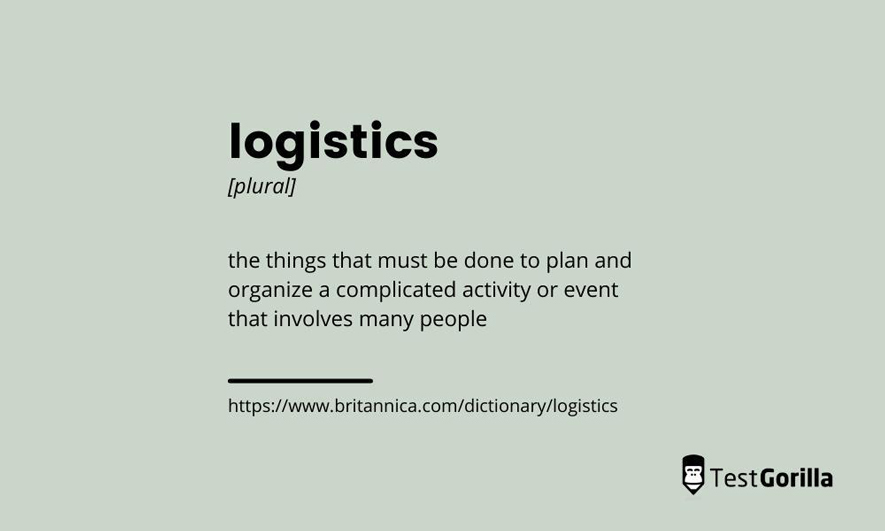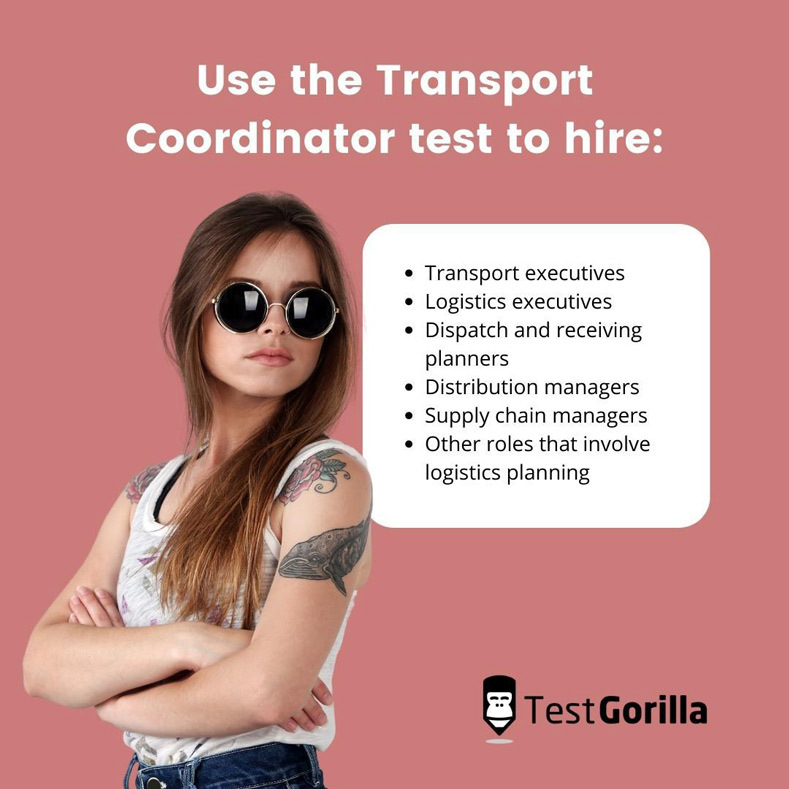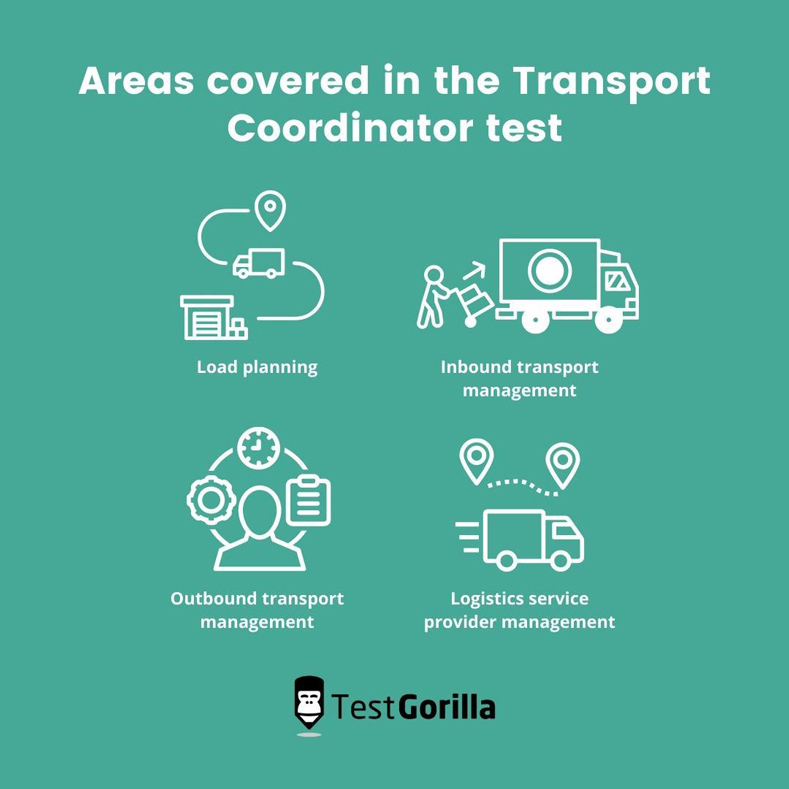How to hire the best logistics managers with a transport coordinator skills test
Table of contents
Logistics tends to be one of those areas that we all take for granted. Our consumer goods appear in the stores like clockwork, yet we don’t give much thought to those that made the magic happen – logistics managers and staff.
If you want to hire a logistics manager but don’t know much about the role, what’s the best way to go about it?
Here’s a big clue: It’s not with CVs.
Our Transport Coordinator test is the fastest, fairest, and most effective way to hire logistics professionals, and will give you the confidence to make the right hire.
After all, no-one intends to make a bad hiring decision. The trouble is that outdated (and often inaccurate) tools like the CV/resume don’t make it easy for recruiters and hiring managers to find the best candidates. However, skills testing does.
We’re going to look at how to use our Transport Coordinator test to find top logistics management talent, and how you can combine this test with up to four others to create a custom pre-hiring assessment.
First, let’s focus on the role of logistics manager/transport coordinator, and the skills they will need to succeed in this role.
What is a logistics manager?
Logistics managers are responsible for ensuring that products and people move from one place to another quickly and as cost-effectively as possible.
Logistics is a key part of the supply chain, and logistics managers work to plan, control, and implement the storage and flow of products, materials, and services.
Good professionals keep things flowing smoothly, minimizing time delays, lost products, or other issues that hold up the supply chain. This role often requires travel to distribution centers, warehouses, and manufacturing facilities, and the job also requires keeping accurate records of inventory.
What are the different types of logistics managers?
Depending on the company and the duties, there are several different types of logistics manager roles:
Supply manager: This role revolves around planning and procuring materials to carry out a task.
Distribution manager: This type of logistics manager ensures that stored materials get where they are meant to be going. They also keep accurate track of stock.
Reverse logistics and product return: This type of logistics professional reclaims materials and supplies from production. This could include excess materials going back into the company’s stock inventory. This role can also focus on the return of unwanted products from customers.
Virtual logistics manager: Virtual logistics professionals handle a variety of logistics duties for clients over the internet. They act as a third-party resource for organizations that can’t handle shipments or other kinds of logistics tasks directly.
Logistics manager duties and responsibilities
Logistics managers have a range of responsibilities, although this will vary depending on the employer. Typically, logistics manager/ transport coordinator duties include:
Strategically planning and managing logistics, warehouse, transportation, and customer services
Directing, optimizing and coordinating the full order cycle
Liaising and negotiating with suppliers, manufacturers, retailers and consumers
Keeping track of quality, quantity, stock levels, delivery times, transport costs, and efficiency
Arranging the warehouse, cataloging goods, planning routes, and processing shipments
Resolving any problems or complaints
Supervising and training the warehouse staff
Meeting cost, productivity, accuracy, and time targets
Maintaining metrics and analyzing data to assess performance and implement improvements
Complying with laws, regulations, and ISO (International Organization for Standardization) requirements
The best insights on HR and recruitment, delivered to your inbox.
Biweekly updates. No spam. Unsubscribe any time.
Key skills for logistics management
Logistics professionals need a range of technical and soft skills to succeed in the role. We have skills tests for many of these, and up to four tests can be combined with the Transport Coordinator test to create a full assessment if you wish.
Combining a range of relevant skills tests in an assessment is an efficient and effective way to gain deeper insight into candidates and can help shape your interview questions.
People management skills
The first thing you need to look for when you want to hire a logistics manager is whether the candidates possess excellent people management skills. Logistics management requires a lot of dealing with different types of people, including customers, warehouse staff, drivers, and managers.
Communication skills
Logistics professionals must be able to communicate effectively with both customers and team members. They should be able to explain things clearly and answer questions in a way that everyone can understand. Logistics professionals also need to have excellent listening skills.
Our Communication test helps you discover which candidates can listen attentively to others and communicate with confidence and open-mindedness. Those who do well on this test can offer both empathy and feedback in an appropriate manner.
Analytical and numerical skills
When you are looking to hire logistics management, it’s important to be sure they have strong analytical and numerical skills. They must make many decisions, such as which storage facility is best for specific products, which transport company should be used, or even how to reduce the organization’s carbon footprint.
Choosing the best option requires analyzing all available data and making decisions based on efficiency, cost, and quality of the service. All this requires candidates to be good with math and analysis.
Our Critical Thinking test helps you find candidates who can think independently, solve complex problems, and generate innovative solutions. This is a great test to check candidates’ overall analytical skills.
The Numerical Reasoning test will also help you identify candidates with strong numerical skills.
Attention to detail
It’s the tiniest details that can come back to bite you if they’re overlooked, and it’s important that a logistics manager is very detail-oriented. One misplaced number or letter can mean time-critical goods end up on the wrong side of the country.
Our Attention to Detail (Textual) test is perhaps one of the most important cognitive ability tests for pre-employment screening. It helps you identify candidates who can thoroughly and carefully handle intricate processes using analytical skills.
Adaptability
Being able to adapt quickly is a key skill for those working in logistics. Unexpected things always seem to crop up, and last-minute plan changes are often inevitable for logistics management.
Good managers take these changes in their stride and find a way to adapt quickly to ever-changing situations.
Forward planning
As mentioned above, plans often need to be changed due to the nature of supply chains. Logistics professionals must have the ability to plan ahead for the possible needs of the organization.
Being forward-thinking means candidates can see potential risks and outcomes of actions made anywhere in the supply chain and act accordingly with contingency plans.
Computer skills
Modern logistics professionals will need to use a range of industry-related software, such as:
Warehouse management software
Supply chain management software
Transportation management software
Third-party fleet management software
Route optimization software
Logistics scheduling software
Driver and vehicle management software
Document management software
Use our Transport Coordinator test to hire logistics managers
Our Transport Coordinator test is written by a subject-matter expert with over 16 years’ experience in supply chain management, warehousing, logistics, and automation.
This test evaluates candidates’ load planning abilities, as well as their inbound and outbound transport management skills. It also evaluates their ability to manage logistics service providers.
The test focuses on real-world scenarios spanning the responsibilities of a transport coordinator. Candidates who do well on this test will be able to use their on-the-job experience to manage both internal and external resources, and get your products to where they need to be as smoothly and efficiently as possible.
You can use this test to hire transport executives, logistics executives, dispatch and receiving planners, distribution managers, supply chain managers, and any other roles that require mastery of transport coordination.
Psst! Looking for a logistics coordinator? Reel in top candidates with this logistics coordinator job description template.
Build your candidate skills assessment
As we touched on earlier, you can create a pre-employment skills assessment consisting of up to five different tests of your choice. It’s easy and fast to build your assessment with tests from our extensive test library, and you get plenty of customization options too.
You may choose to include tests for the logistics manager key skills that we mentioned above, or you can browse the test library to see which tests are relevant to the role you are hiring for.
Our test library is divided into the following categories:
You’re sure to find the tests to fit your hiring needs, whatever role you are recruiting for.
Take the next step with us
Hiring logistics professionals can be tricky unless you know what to look for in candidates, and have an accurate way of measuring their skills with a test like the Transport Coordinator test.
A skills assessment equips you with the data needed to make good hiring decisions based on a strong foundation of job-related skills, and not on a list of past experience and education in a CV.
Sign up for your free plan to get started on building your first assessment for a logistics manager today.
If you want more information or to see how our products work first-hand, book a free 30-minute live demo with our sales team, who will be pleased to answer any questions you may have. If you’re ready to dive right in, head over to our pricing page and check out our range of plans to suit all businesses.
You've scrolled this far
Why not try TestGorilla for free, and see what happens when you put skills first.

















